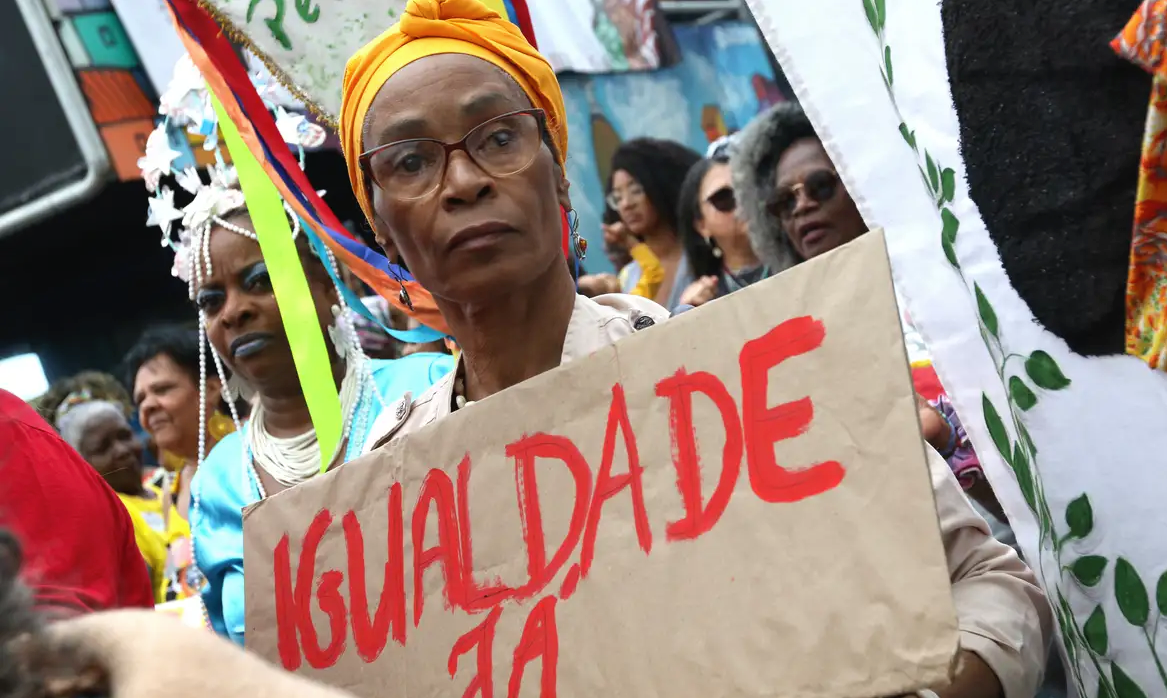United Nations reports indicate that racial factors determine the composition of the new forms of poverty and misery in the world. As a result, black women occupy even more drastic positions of extreme vulnerability and are the most affected by the privatization of public services.
According to Oxfam’s recent Econuestra report, Latin America and the Caribbean is the most unequal region in the world and the place where the rich account for most of the total wealth, after the Middle East and North Africa, and where the poorest 50% have as little wealth as Sub-Saharan Africa. In a great sign of the vulnerabilities imposed by race, black people and families appear among those who are pushed out of the labor market or those who, once employed, are exploited, underpaid, with frequent abuses and violations of rights. According to the Demographic Center of Latin America and the Caribbean (CELADE), in Latin America, the Afro-descendant population is estimated at 153.7 million people, which represents 23.7% of its total population.”
Within this group, black women experience multiple conditions of exclusion, inequality and lack of citizenship. Despite their achievements, poverty and significant income gaps persist and penalize them. In the United States, for example, “the net worth of an average black family is only 15.8% that of an average white family”, while in Brazil, “on average, the income of white people is more than 70% higher than the income of black people”, reveals the annual report by Oxfam International.
Adding the gender dimension, in Brazil, according to the monitoring and evaluation published by the Ministry of Racial Equality, black women account for 38.5% of the people on the CadÚnico (Brazilian Unified Registry). Similarly, they have the lowest levels of schooling and, as a result, the worst positions in the job market when compared to white women.
In general, black people in Brazil are the majority in informal work, understood by the Inter-Union Department of Statistics and Socio-Economic Studies (DIEESE) as “employees in the private sector without a signed work permit; domestic workers without a signed work permit; employers without registration with the National Register of Legal Entities (CNPJ); self-employed workers without registration with the CNPJ; and auxiliary family workers.” But if we consider only the 5.8 million informal domestic workers, more than 91.4% are women, 67% of whom are black women.
The impact of privatization
Against this backdrop, Oxfam’s report on global inequality, presented at the World Economic Forum in Davos, adds that the future could be even bleaker: “It will take 230 years to end poverty, but we could have our first trillionaire in 10 years.” The Western world is experiencing a new era of deepening inequalities and social injustices, with a drastic increase in social division, the strengthening of monopoly power and the empowerment of large companies, as indicated by the report, which assures: the privatization of public services is a relevant practice in this process.
At the first level, privatization would bring unequivocal profitability to big business. And further down the line, it would increase exclusion and impoverishment, of which the most affected are groups defined by gender, race and ethnicity, especially racialized women. In the context of geopolitical dynamics, with relations established in the countries of the Global North, immigrants. In the internal case of countries like Brazil, formed as a result of slavery and colonization, black women, above all.
It was for no other reason that the representative of Oxfam Brazil, when she was part of the coalition for the 3S Tax Reform and took part in the public hearing held by the Working Group on the Regulation of the Tax Reform, declared: “hunger in Brazil has the face of a black woman”, corroborating the report released, for which all the inequalities verified at a global level are exacerbated when they are crossed by conditions of gender, race, origin (in the case of immigrants); in short, by social markers of difference that underpin practices of discrimination.
The privatization of public services and the vulnerability of black women
The incentives for national states to invest in the privatization of public companies and services are strategic for this global model of producing power by strengthening large private companies.
These privatizations can take the form of selling off companies or handing over the provision of services to the private sector, such as electricity and water. Or even by making basic services such as education, health, and security more precarious, in order to favor competition with private providers of the same service.
The direct consequence is the weakening of labor relations, especially when associated with policies to make labor laws more flexible; an association that often pushes a large part of the workforce into outsourced and precarious work.
In both models, impoverished and poorly paid workers are made to act as second-class consumers in a system of offers geared toward the profitability and enrichment of companies. As second-class clients and consumers, their citizenship status is reduced and, with it, their access to fundamental rights that were once guaranteed by national states.
If the privatization of public services affects the entire population at the bottom of social relations, with a scarce stock of fundamental capital for their self-maintenance, such as educational, political and economic capital, it certainly exacerbates the situation of those who form the most vulnerable group of this deprived base: black women.
Black women are often led to see the state and access to public services as a real possibility of guaranteeing a minimum quality of life for themselves and their families. In Brazil, according to the National Health Survey, black women accounted for 60.9% of the public who used the Unified Health Service (SUS). Similarly, education, security, justice services and other public services are largely accessed by black people and families, often headed by black women.
In a global scenario, privatization processes affect them directly: they make them vulnerable by making them part of informal work, especially cleaning work; they deprive them of their basic condition of citizenship, depriving them of rights; and they impoverish them, making it difficult for them to access fundamental services.
For this reason, as much as a cog in the wheel of the production of economic asymmetries, privatizations should be understood as subtle and potential mechanisms to hide the face of a kind of racism that reproduces itself, freely, organizing the world and keeping black women in a structural condition of vulnerability.
*Translated by Janaína Ruviaro da Silva from the original in Portuguese.













